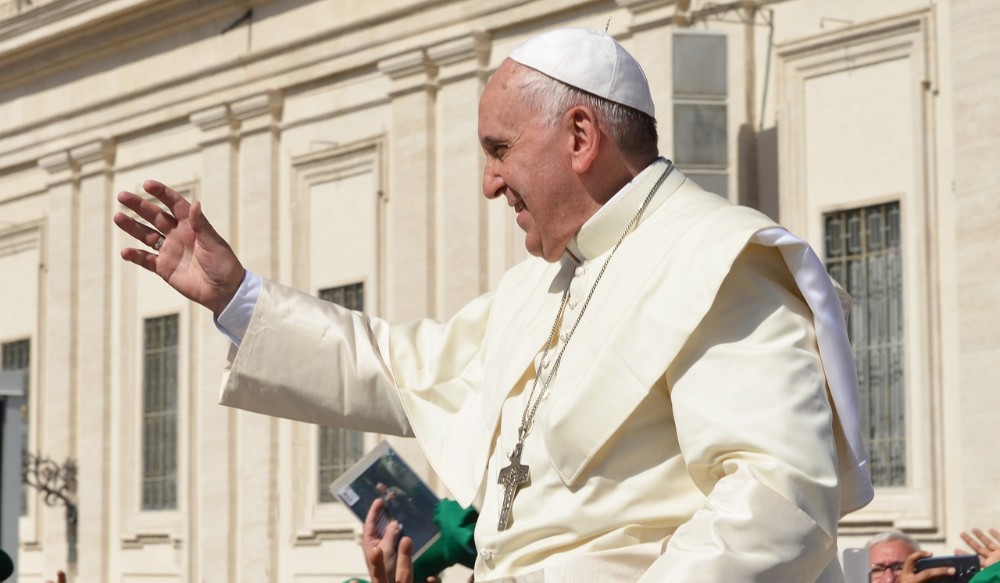When Seattle’s then-Archbishop Raymond Hunthausen allowed gay and lesbian Catholics from Dignity USA to hold Mass in St. James Cathedral, his action triggered a Vatican investigation that resulted in a bid to strip Hunthausen of his authority.
Such was the attitude of the Catholic Church toward LGBTQ faithful — condemnation combined with the cold shoulder. All this makes the attitude and actions of Pope Francis so startling. The Jesuit pope has embraced the formerly ostracized, both expanding ministry while not walking back doctrine. The action is welcome, a correction of what many in the laity think to be a clerical error. It will also be unsettling to influential and entrenched conservatives in the American Catholic hierarchy.
After months of hints, a Vatican declaration this past week gave a green light to blessing of those in “irregular” relationships, namely same-sex unions and the marriages of previously divorced Catholics. In words of the Congregation for the Doctrine of the Faith, those being blessed “should not be required to have prior moral perfection.”
The Vatican stressed that this is neither authorization or approval of same-sex marriage. The church’s ban still stands. Same-sex couples can tie the knot at St. Mark’s Episcopal Cathedral, with full Episcopal liturgy, but not at St. James.
Still, recent actions by Pope Francis amount to a massive change in pastoral ministry. Pope Francis has also okayed the baptizing of transgender persons as well as allowing them to serve as godparents. The blessing is bestowed, in the Vatican’s careful language, so that those in “irregular” unions “may mature and grow in fidelity to the Gospel, that they may be freed from their imperfections and frailties, and that they may express themselves in the ever-increasing dimension of divine love.”
The blessing “descends from God” upon those “in need of His help” and affirms “all that is true, good and humanly valid in their lives and their relationships be enriched, healed and elevated by the presence of the Holy Spirit.”
Consider and compare these words — and Francis’ famous question about gays, “Who am I to judge?” — with the call of his predecessor, Pope Benedict XV1, for resistance against “the powerful political and cultural currents seeking to alter the legal definition of marriage.”
The U.S. Conference of Catholic Bishops, headed by Benedict-era culture warriors, was quick in delivering a chilly clarification to Francis’ openness. Nothing has changed here.
“The Church’s teachings on marriage have not changed,” said the USCCB, “and this declaration affirms that while also making an effort to accompany people through the imparting of pastoral blessings because each of us needs God’s healing, love and mercy in our lives.”
One prelate, Bishop Joseph Strickland, urged outright disobedience, telling a conservative news outlet: “We will not incorporate this into the life of the Church since we should just say no.” (The Pope recently removed Strickland from his post as Bishop of Tyler, Texas.)
There’s different reaction in the pews. A majority of America’s Catholic laity appear to have rejected the “three d’s” of their faith hierarchy — discipline, dogma, and docility. They have also taken a more expansive and accepting view of relationships. A Pew Research poll recently found 60 percent support for same-sex marriage, a level of support commensurate with the public as a whole.
Our state’s Catholic bishops fought against recognition of same-sex civil unions (2009) and marriage(2012). The Legislature and voters approved both, with a Catholic governor — Christine Gregoire — as advocate. Catholics for Marriage Equality put 500 demonstrators on the street outside St. James Cathedral a week before Election Day.
Archbishop J. Peter Sartain forbade any use of parish facilities for any activity related to gay “marriage” — the quotation marks were his — or pastoral counseling of same-sex couples headed for the altar.
The church’s stresses have been on public display. Gay and lesbian faculty, married and engaged, have been forced out at Eastside Catholic and John F. Kennedy High Schools. Crowds of students responded by rallying in protest — and quoting scripture — outside the archdiocesan chancery.
“What would Jesus say?” asked a sign carried by one student. Neither Archbishop Paul Etienne nor predecessor Archbishop Sartain emerged to answer the question. In contrast to the United States, bishops in Europe have already signaled they are open to blessing same-sex unions. Bishops in Belgium have drawn up guidelines. An unauthorized blessing was recently held in the German city of Cologne.
The Rev. James Martin, a Jesuit (like Francis) and former editor of America magazine, is a longtime advocate for LGBTQ recognition by his church. Martin has had speeches canceled and venues changed. He was, however, recently welcomed at the Vatican by Pope Francis.
Martin cheered the incremental change in the air, saying Monday: “The declaration opens the door to non-liturgical blessings for same sex couples, something that had previously been off limits to bishops, priests and deacons.
“Along with many priests, I will now be delighted to bless my friends in same-sex unions.”
Discover more from Post Alley
Subscribe to get the latest posts sent to your email.

Political philosophy shouldn’t underpin religious beliefs.
The Bishop of Rome was acting on political philosophy when he removed the Bishop of Tyler from his diocese.
https://x.com/bishstrickland/status/1738289795015835730